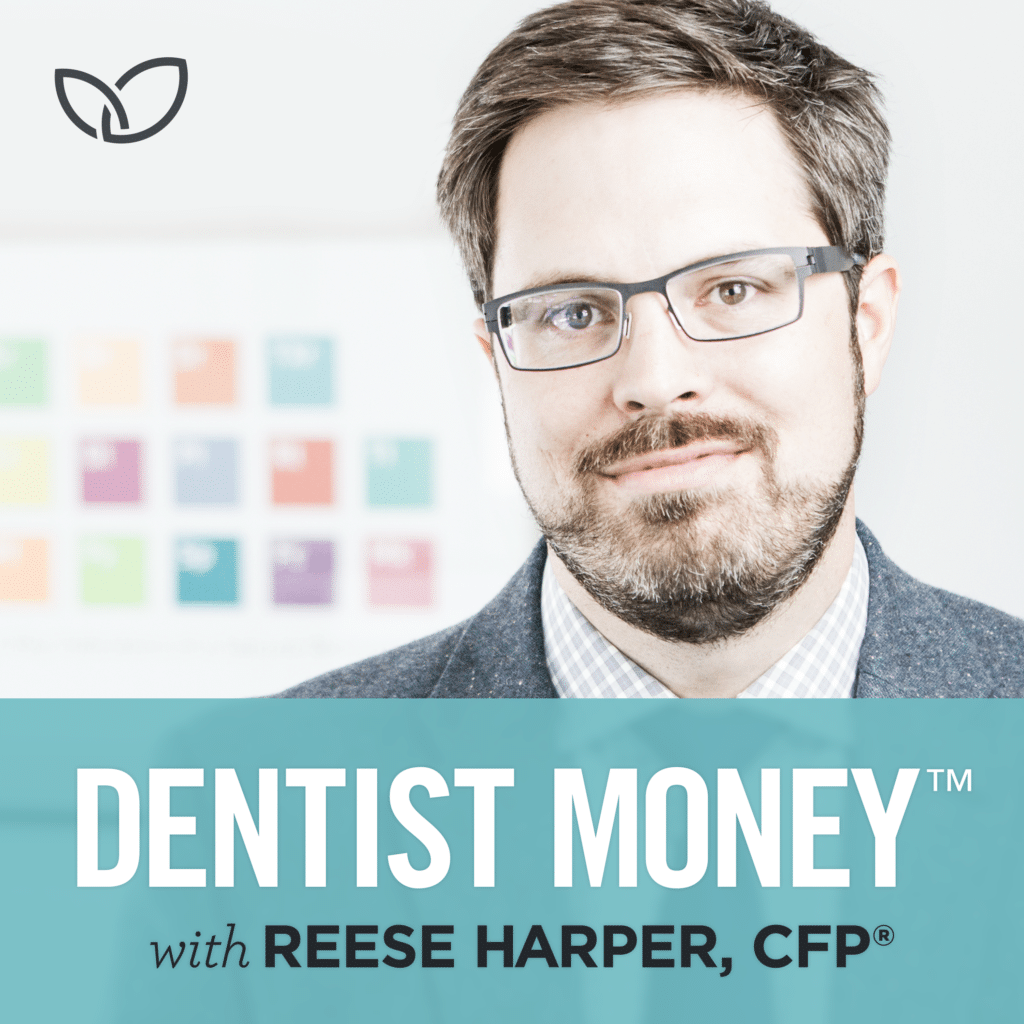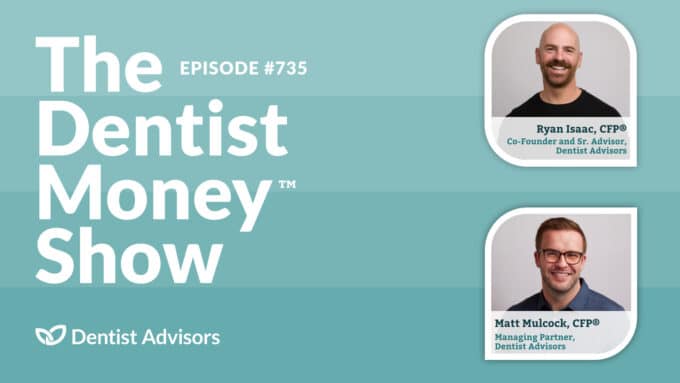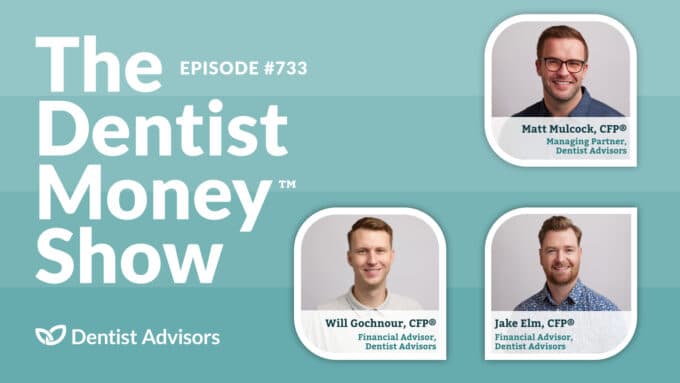How Do I Get a Podcast?
A Podcast is a like a radio/TV show but can be accessed via the internet any time you want. There are two ways to can get the Dentist Money Show.
- Watch/listen to it on our website via a web browser (Safari or Chrome) on your mobile device by visiting our podcast page.
-
Download it automatically to your phone or tablet each week using one of the following apps.
- For iPhones or iPads, use the Apple Podcasts app. You can get this app via the App Store (it comes pre-installed on newer devices). Once installed just search for "Dentist Money" and then click the "subscribe" button.
- For Android phones and tablets, we suggest using the Stitcher app. You can get this app by visiting the Google Play Store. Once installed, search for "Dentist Money" and then click the plus icon (+) to add it to your favorites list.
If you need any help, feel free to contact us for support.
Subscribe to the Dentist Money™ Show for free
Do you know exactly how much you spend? How much does it vary over the course of a year? Why do you need to know with so much precision? Which expenses should you be tracking and not tracking? This episode explores how hot dogs, pizza, and root beer can help you prepare for a more comfortable retirement.
Tune in for the best advice on financial planning for dentists.
Podcast Transcript:
Reese Harper: He’s off by 30-35% similar to that study, and I’ve seen that. It happens. Whatever you spend is all-relative. You generally spend a percentage of your income, and the more you make the more you’re going to spend, but the variance of what you think you spend is usually similar.
Ryan Isaac: So if someone is hearing this and they’re thinking, Oh that’s totally me. Are they the anomaly? They’re just the worst dentist in the world and they have no hope? Just turn it off right now.
Reese Harper: No, you’re good people out there. I had that problem. I don’t have it anymore because I’ve been tracking this for too long.
Ryan Isaac: You track how much you sleep.
We’ve said separate business and personal. We have said use something concrete. We’re not going to get into apps, but there are so many apps, websites and free software you can use. We use practice management software for financial advisors.
There’s the accountability part to it. And when you and I have talked about this podcast specifically, we’ve talked about how it’s the emotional tendency to discount certain things. To say, “this month was right on track with what I thought except I went to Costco and got a TV, some tires, a casket, a lawn mower.” But that isn’t an anomaly. That tends to happen; it’s human nature to discount things. How does accountability to play into this? And is it really about babysitting? I think that’s what people really want to know about spending is if someone is going to micromanaged.
Reese Harper: In some level, we believe in accountability because that’s how we built our careers. If you look at the inherent value in a financial advisor— it’s someone who knows you well enough to call you on it when you aren’t being totally honest with yourself. Whether it has to do with anything you want to do with your money, someone is going to know you well enough to ask if it’s the right thing.
I think accountability from someone, whether it’s a spouse or a friend, though I would use someone outside your family, you want someone who can ultimately look at your spending over the last 3-5 years and analyze it with you and make sure you’re track. It’s the most private thing anyone has. You don’t tell anyone how much you spend, and that number isn’t something you share. Consequently, you don’t look at it a lot either, and it tends to inflate. I just think it’s helpful to have someone say, “you used to spend 22% of your income, and now you spend 40%. You’re in the same house making the same amount of money, and you have the same amount of kids.” At some level, accountability does help people in any area of life—tracking numbers and staying true to statistics. Any coach will tell you that.
Ryan Isaac: In another podcast, I think there’s an even better way to make sure you’re not overspending, and it has to do with savings rate. But that’s a teaser—that’s how you do it right? Leave a little bit of a teaser?
Let’s summarize then: why should a dentist track his personal spending?
Reese Harper: Primarily you should track your personal spending because you will have no idea when you can retire or how much you’re going to need unless you have a really clear, specific number on what you’re going to actually withdraw. And that’s not just based on a guess or an assumption. It’s what you actually did over the last five years on average and you want to just build your portfolio to be the size that it needs to be to support that number and not change your spending. Just like changing your eating habits at retirement. I drink pizza, and I eat root beer, and I’ll do it either way. I can eat pizza, drink root beer, or I will drink pizza and eat root beer. I don’t care how it happens. But if I’m sixty-five, I guarantee I’m still going to be tapping that glass bottle. And I’m going to be ordering a late night one. I can’t tell myself at this point that I’m going to stop eating pizza because I know that’s not true. I like a thin crust.
So here’s the deal, you get to sixty-five, and if you have been spending a certain way you’re not going to change in two years. And if you do, it will be short lived.
Ryan Isaac: No one is going to reduce his or her lifestyle or comfort level and even then it’s very difficult.
Reese Harper: They will just end up going back to work because they don’t really want to change the things they are used to. Maybe I’m being a little harsh, but I do think there’s some wisdom in saying, “I’m probably not going to change how I spend dramatically.” Over time you can, but you have to prove to yourself you’ve done it for two or three years consistently.
Ryan Isaac: Well let’s wrap up with best pizza. Since we started by talking about food, let’s end by talking about food. I can see the look on your face, that’s too hard.
Reese Harper: I’ll be honest, I ordered a little red William Sonoma cooker for my kitchen, and I’m buying this pizza dough from Trader Joe’s downtown, and I’m cooking it myself—organic marinara sauce with some basil and a little bit of mozzarella.
Ryan Isaac: Gluten free?
Reese Harper: No way. If I had to, it would be.
Ryan Isaac: I don’t even know what it means. I think you’re just supposed to ask now days.
Reese Harper: I really am trying to be low gluten, but I’m struggling right now. To anyone out there who is: I’m not trying to be offensive. I’m just saying it’s hard to eat pizza gluten free. It just ends up being a little chewy.
Ryan Isaac: I think that covers it.
Reese Harper: Thanks for tuning in today everybody. When you have more questions, go to the dentistadvisors.com website. You can sign up for our newsletter, get a series of e-guides and emails that go over some of our methodology a little bit more.
Ryan Isaac: And if you’ve got more questions, there’s a link at the top of the website you can schedule a free phone call with one of our advisors at your convenience. It’ll put it on our calendar, and we’d be happy to chat with you.
Behavioral Finance, Spending, Tracking Progress



